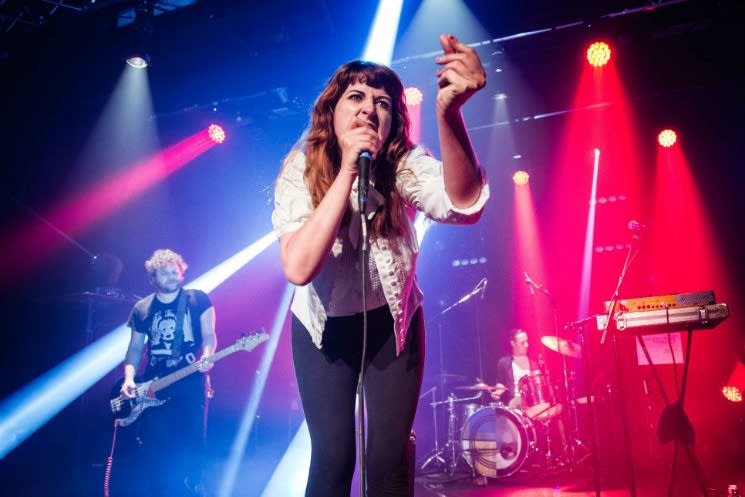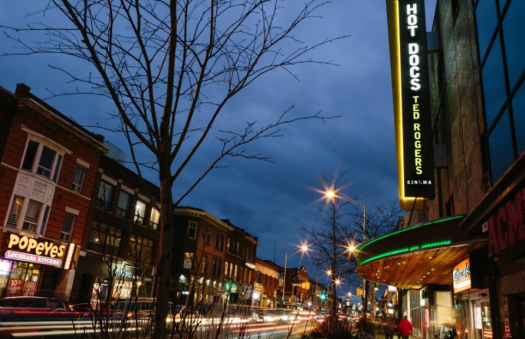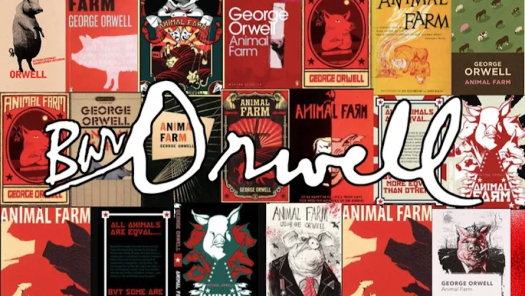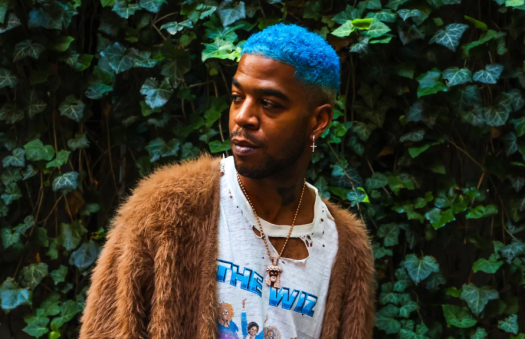It's been 18 years since Daft Punk played at Jame's Murphy's house, and dance-punk is once again having a moment.
Part of a broader interest in post-punk, dance-punk (or indie dance, if you prefer) burned bright in the mid-2000s, merging punk's jagged energy with dance music's smooth grooves. Its time in the spotlight produced a wide array of sounds, from Franz Ferdinand's dance floor-filling post-punk to the and spacey funk of !!! to the garage howls of the Yeah Yeah Yeahs. But the idea that indie rock and dance music need not be mutually exclusive has been its most lasting legacy.
Recently, Murphy's band LCD Soundsystem were the focus a serious Oscar buzz for Best Original Song (although they didn't end up getting the nomination). Bloc Party are opening for Paramore on the latter's upcoming arena tour, and the artwork for singer Kele's single "True Love Knows No Death" references Bloc Party's much-loved debut. New Orleans band Special Interest used the genre as a template for their agitpop grooves on last year's breakout, Endure. Then, of course, there was the emergence of the indie sleaze aesthetic, of which dance-punk is a foundational building block. Add in young upstarts like the Dare and you've got the makings of a full-blown revival.
Dance punk's time in the sun coincided with a larger international spotlight on Canadian indie music, so it should come as no surprise that bands like Toronto's Death From Above 1979 and Victoria's Hot Hot Heat became breakout stars, shimmy-ing their way into careers that extended well past the genre's expiry date.
But they were just the tip of Canada's hip-shaking, white-belt-wearing iceberg. Nobody likes to be put in a box, but in an age of nu metal and pop-punk, there was a major groundswell of bands putting danceability on par with sick riffs. Here are eight Canadian artists we think could (once again) get butts wigglin' in the impending dance-punk revival.
controller.controller
Toronto's controller.controller mixed spooky post-punk rhythm with new wave romanticism, quickly gaining a national profile with 2004's History EP. A full-length and further success followed, but it all came crashing down when singer Nirmala Basnayake left in 2006. They reunited to play 2015's Wavelength festival, but the group have been largely inactive since bass player Ronnie Morris (who also co-founded Lioness with drummer Jeff Scheven) suffered a stroke.
Duchess Says
Duchess Says felt like they could light the world (or at least the dance floor of your favourite dive bar) on fire from the word go. Their 2005 EP, Noviçiat Mère-Perruche, deployed heavy synths, rumbling bass and tasteful handclaps over singer Annie-Claude Deschênes' onomatopoeia-inspired vocals. But it was the band's live show, particularly Deschênes's confrontational approach to crowd work, that helped spread the band's cult legend. A tour with the Yeah Yeah Yeahs followed, and rumours that Murphy's DFA Records was getting involved swirled. But their debut, great as it was, didn't arrive until 2008. Follow-ups continued to capture their unique energy, but with no new music since 2016's Sciences Nouvelles, it would seem that the Church of the Budgerigars, the "religious organization" the group claim to have been part of, has closed up shop.
Put the Rifle Down
Holding down the more electronic end of the dance-punk spectrum, Put the Rifle Down were a local buzz band in Toronto on the back of their Let Us Proclaim EP. But issues with their label delayed the release of their debut, Selector, until 2009, by which time the culture had moved on. Still, the band's New Order-indebted synthpop was heavy on melody, ensuring that songs like "My Industrial Park" and "Architekt" remained lodged in fans' heads long after the band disappeared from the scene.
The Red Light Sting
The Red Light Sting never quite fit under any single label, but the Vancouver five-piece's jittery, scream-y groove could certainly tear up dance floors when it suited the group. Featuring former d.b.s. guitarist Andy Dixon and drummer Paul Patko, the band's debut was a split with a pre-Steven Bays fronted Hot Hot Heat on Dixon's own Ache Records (which would also release the debut EP from Death from Above 1979). EPs, a single and finally a full-length in 2004 punctuated tours that fostered ties with a host of left-of-centre art punk weirdos before the band split. Dixon kept busy making experimental electronic music, and even re-teamed with Red Light Sting singer Gregory Adams in Healthy Students, before becoming a well-regarded visual artist.
Shout Out Out Out Out
The most high-profile band to come out of the scene built around Edmonton's Normal's Welcome Records, Shout Out Out Out Out (that's four "Outs" for those counting at home) were the scene's goofy id, embracing seemingly innocuous concepts and turning them into dive bar bangers (see: "Procastinator's Fight Song," "Chicken Soup for the Fuck You"). Though their recordings arguably never captured their high energy (and Hi-NRG) live shows, their three LPs are helpful reminders that music can be both important and fun.
The Sick Lipstick
Formed by Mark McLean and Lindsey Gillard after the disillusion of Black Cat #13, which counted Jesse F. Keeler, later of DFA1979, among its members, the Sick Lipstick played a very particular brand of noisey no-wave anchored by Gillard's riot grrrl-inspired lyrics. As with the Red Light Sting, they were only tangentially related to what later became known as dance-punk — the mere presence of a keyboard was borderline heretical in certain punk circles at the time. But even with their confrontational style, hooks and grooves stuck out, especially on their great debut Sting Sting Sting, produced by Al-P (who later formed one-half of MSTRKRFT).
Woodhands
Toronto analog electropop duo Woodhands seemed closer to the city's indie rock scene than its punk or dance scenes — but Dan Werb and Paul Banwatt managed to capture the energy of the both without taking themselves too seriously. Both Werb and Banwatt remained active in Ontario's indie scene after Woohdhands' final album (to date) in 2010, but these days both are more active outside of music — Werb as an epidemiologist and policy analysis, and Banwatt as a lawyer.
You Say Party! We Say Die!
Arguably the most well-known band on this list, Vancouver's You Say Party! We Say Die! have gone through many changes over the years, most notably truncating their name to You Say Party and morphing into more moody and abstract territory following the tragic onstage death of their drummer, Devon Clifford. But the band started life as a party-starting dance-punk act — singer Becky Ninkovic once sang the first several songs of the band's set at a Mint Records Christmas Party dressed as a giant Christmas present — and their debut album anchored that enthusiasm with a knack for marrying killers hooks and social commentary. "The Gap" somehow feels more relevant today than it did 18 years ago.
Part of a broader interest in post-punk, dance-punk (or indie dance, if you prefer) burned bright in the mid-2000s, merging punk's jagged energy with dance music's smooth grooves. Its time in the spotlight produced a wide array of sounds, from Franz Ferdinand's dance floor-filling post-punk to the and spacey funk of !!! to the garage howls of the Yeah Yeah Yeahs. But the idea that indie rock and dance music need not be mutually exclusive has been its most lasting legacy.
Recently, Murphy's band LCD Soundsystem were the focus a serious Oscar buzz for Best Original Song (although they didn't end up getting the nomination). Bloc Party are opening for Paramore on the latter's upcoming arena tour, and the artwork for singer Kele's single "True Love Knows No Death" references Bloc Party's much-loved debut. New Orleans band Special Interest used the genre as a template for their agitpop grooves on last year's breakout, Endure. Then, of course, there was the emergence of the indie sleaze aesthetic, of which dance-punk is a foundational building block. Add in young upstarts like the Dare and you've got the makings of a full-blown revival.
Dance punk's time in the sun coincided with a larger international spotlight on Canadian indie music, so it should come as no surprise that bands like Toronto's Death From Above 1979 and Victoria's Hot Hot Heat became breakout stars, shimmy-ing their way into careers that extended well past the genre's expiry date.
But they were just the tip of Canada's hip-shaking, white-belt-wearing iceberg. Nobody likes to be put in a box, but in an age of nu metal and pop-punk, there was a major groundswell of bands putting danceability on par with sick riffs. Here are eight Canadian artists we think could (once again) get butts wigglin' in the impending dance-punk revival.
controller.controller
Toronto's controller.controller mixed spooky post-punk rhythm with new wave romanticism, quickly gaining a national profile with 2004's History EP. A full-length and further success followed, but it all came crashing down when singer Nirmala Basnayake left in 2006. They reunited to play 2015's Wavelength festival, but the group have been largely inactive since bass player Ronnie Morris (who also co-founded Lioness with drummer Jeff Scheven) suffered a stroke.
Duchess Says
Duchess Says felt like they could light the world (or at least the dance floor of your favourite dive bar) on fire from the word go. Their 2005 EP, Noviçiat Mère-Perruche, deployed heavy synths, rumbling bass and tasteful handclaps over singer Annie-Claude Deschênes' onomatopoeia-inspired vocals. But it was the band's live show, particularly Deschênes's confrontational approach to crowd work, that helped spread the band's cult legend. A tour with the Yeah Yeah Yeahs followed, and rumours that Murphy's DFA Records was getting involved swirled. But their debut, great as it was, didn't arrive until 2008. Follow-ups continued to capture their unique energy, but with no new music since 2016's Sciences Nouvelles, it would seem that the Church of the Budgerigars, the "religious organization" the group claim to have been part of, has closed up shop.
Put the Rifle Down
Holding down the more electronic end of the dance-punk spectrum, Put the Rifle Down were a local buzz band in Toronto on the back of their Let Us Proclaim EP. But issues with their label delayed the release of their debut, Selector, until 2009, by which time the culture had moved on. Still, the band's New Order-indebted synthpop was heavy on melody, ensuring that songs like "My Industrial Park" and "Architekt" remained lodged in fans' heads long after the band disappeared from the scene.
The Red Light Sting
The Red Light Sting never quite fit under any single label, but the Vancouver five-piece's jittery, scream-y groove could certainly tear up dance floors when it suited the group. Featuring former d.b.s. guitarist Andy Dixon and drummer Paul Patko, the band's debut was a split with a pre-Steven Bays fronted Hot Hot Heat on Dixon's own Ache Records (which would also release the debut EP from Death from Above 1979). EPs, a single and finally a full-length in 2004 punctuated tours that fostered ties with a host of left-of-centre art punk weirdos before the band split. Dixon kept busy making experimental electronic music, and even re-teamed with Red Light Sting singer Gregory Adams in Healthy Students, before becoming a well-regarded visual artist.
Shout Out Out Out Out
The most high-profile band to come out of the scene built around Edmonton's Normal's Welcome Records, Shout Out Out Out Out (that's four "Outs" for those counting at home) were the scene's goofy id, embracing seemingly innocuous concepts and turning them into dive bar bangers (see: "Procastinator's Fight Song," "Chicken Soup for the Fuck You"). Though their recordings arguably never captured their high energy (and Hi-NRG) live shows, their three LPs are helpful reminders that music can be both important and fun.
The Sick Lipstick
Formed by Mark McLean and Lindsey Gillard after the disillusion of Black Cat #13, which counted Jesse F. Keeler, later of DFA1979, among its members, the Sick Lipstick played a very particular brand of noisey no-wave anchored by Gillard's riot grrrl-inspired lyrics. As with the Red Light Sting, they were only tangentially related to what later became known as dance-punk — the mere presence of a keyboard was borderline heretical in certain punk circles at the time. But even with their confrontational style, hooks and grooves stuck out, especially on their great debut Sting Sting Sting, produced by Al-P (who later formed one-half of MSTRKRFT).
Woodhands
Toronto analog electropop duo Woodhands seemed closer to the city's indie rock scene than its punk or dance scenes — but Dan Werb and Paul Banwatt managed to capture the energy of the both without taking themselves too seriously. Both Werb and Banwatt remained active in Ontario's indie scene after Woohdhands' final album (to date) in 2010, but these days both are more active outside of music — Werb as an epidemiologist and policy analysis, and Banwatt as a lawyer.
You Say Party! We Say Die!
Arguably the most well-known band on this list, Vancouver's You Say Party! We Say Die! have gone through many changes over the years, most notably truncating their name to You Say Party and morphing into more moody and abstract territory following the tragic onstage death of their drummer, Devon Clifford. But the band started life as a party-starting dance-punk act — singer Becky Ninkovic once sang the first several songs of the band's set at a Mint Records Christmas Party dressed as a giant Christmas present — and their debut album anchored that enthusiasm with a knack for marrying killers hooks and social commentary. "The Gap" somehow feels more relevant today than it did 18 years ago.




